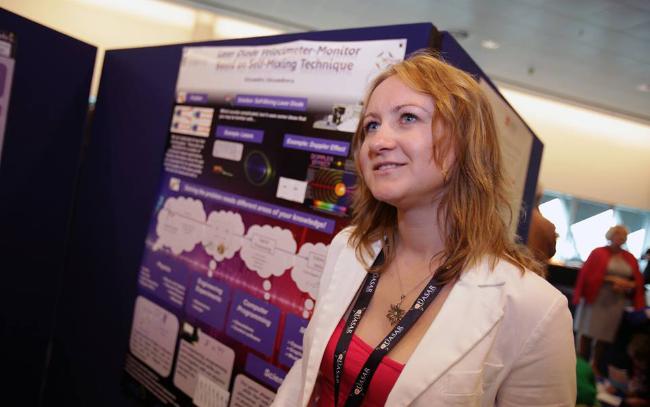Dr Alexandra Alexandrova: “I'm a goal-oriented person who wants to see results, maybe not immediately but in the near future.”

“I was always very good at maths hence physics at school was easy for me. However, I wanted to develop computer games as I always had a passion for them and I was good at drawing, so I decided to go to university which offered a broad education in physics and engineering with specialisation in the final years (that's how the university education works in Russia).
When we were introduced to theoretical physics, and in particular theoretical mechanics, I just fell in love with physics. With Physics, I found an application for my talent in maths, I was able to understand the basic building blocks of our existence, and even theoreticize myself. That's how my journey of being a researcher began.”
Dr Alex Alexandrova joined the QUASAR Group in 2012 as a Marie Skłodowska Curie Fellow within the Department of Physics at Liverpool University / Cockcroft Institute, and she belonged to the LA3NET (Lasers for Applications at Accelerator facilities) training network. Her project has developed a better method for characterising high velocity targets, allowing precise measurements even in radiation-exposed environments.
From October 2015, Alex has been awarded with a Royal Society of Edinburgh/STFC Enterprise Fellowship. RSE Enterprise Fellowships enable promising science and technology researchers to grow into successful entrepreneurs. This prestigious award will allow Alex to focus solely on refining her business ideas, whilst gaining access to some of the best commercial training and mentorships available in the United Kingdom.
She has recently co-founded technology company D-Beam to commercialise some of her research results.
“I'm a goal-oriented person who wants to see results, maybe not immediately but in the near future. I have always been interested in seeing direct applications for the work that I'm doing rather than in new research where I may never see how it's going to be applied. I have noticed that often a research group will develop some instrument or technique, they use it and then move on. I thought it was such a shame that people put in so much effort, and when the grant money runs out no one will take it further. Especially as a couple of years later, someone else will have the same need and develop something similar.
I love science: I still do research quite a lot, and I like being in the lab, but at the same time I'm thinking “this is a great idea, where can we use it? Can we apply it here?” It's broadened my mind.”
“With some determination and the ability to see the problems first as challenges, then turning them into opportunities, anyone can achieve what they want…”
“Back in Russia I found that in my laboratory, the world was a bit biased, so I had some trouble being a woman. But as soon as I proved my point and they saw that I knew quite a lot and sometimes even more than them, the men would appreciate my input. When I moved to the UK I found that here it's more gender equal – people listen to you no matter how you look, how you dress, if you're wearing a skirt or jeans. I believe that many of us, especially women, are getting discouraged by problems. For myself, I found that with some determination and the ability to see the problems first as challenges and then turning them into opportunities, anyone can achieve what they want and even more.”